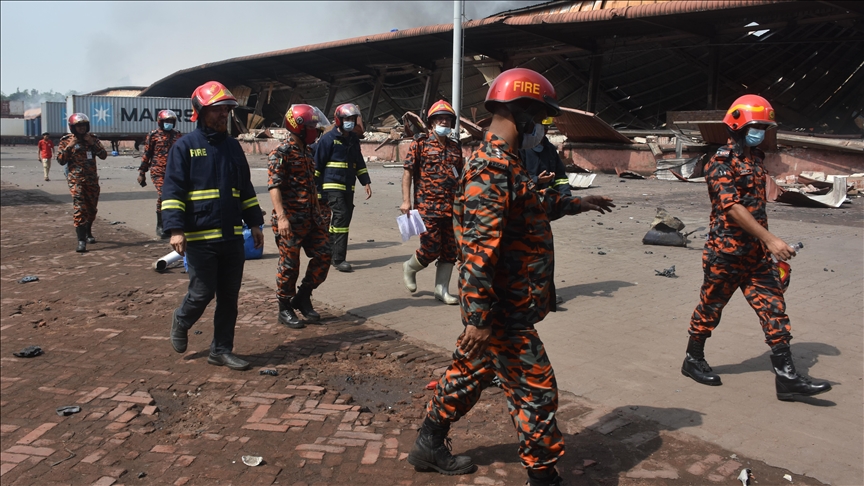Factory fires rising in South Asian nation as safety law flouted
SM Najmus Sakib |
28.06.2022

DHAKA, Bangladesh
Firefighters in Bangladesh perform duties without safety gear and adequate training amid a rise in factory fires in the South Asian nation.
Earlier this month, 12 firefighters died when a fire broke out at a chemical depot in Chattogram, Bangladesh's main port. The casualties recorded were the highest in the Fire Department since 1981.
Ill-equipped firefighters on the spot tried in vain to control the massive blaze, which was eventually doused by the Bangladeshi army.
In the last decade alone, 16,000 fire incidents have occurred in Bangladesh killing 1,590 people, including firefighters, according to the Bangladesh Environment Lawyers Association, a local group with a focus on the safety of workers.
Speaking to Anadolu Agency, Ali Ahmed Khan, former head of the Bangladesh Fire Service and Civil Defense, shed light on the state of fire safety in the country.
"The capacity of our Fire Department is poor when compared to other countries in the West or Europe. According to the global standard, one firefighter is required for 500 people. We have only 13,000 firefighters against a population of 165 million.”
Among them, 150 firefighters are trained to extinguish chemical-induced fires.
The country's fire safety law makes it mandatory for organizations to train 18% of their staff to use fire extinguishers. However, the law is being flouted. Without regular fire drills, employees are often unaware of safe exits in case of an emergency.
People living in the congested streets of old Dhaka, the country's capital, also store highly inflammable chemicals in their houses or shops making it a fire hazard.
The response time for a fire incident is 8 minutes because after 10 minutes it spreads out of control, he said.
However, in the unplanned metropolises of Dhaka and Chittagong, the roads are too narrow for fire engines to respond immediately, Khan said.
According to an assessment of the Fire Department, 90% of buildings in seven city corporations in the country lacked fire safety arrangements, and more than 40% of the hospitals and healthcare centers in Dhaka had no fire-fighting capabilities.
He said more than strengthening the Fire Department, there was a need to enhance and enforce fire safety mechanisms.
“There is a serious gap in the fire safety inspection in buildings and warehouses. Building owners do not run regular inspections, audits, and surveys of buildings or risk assessment to keep their structure safe,” Khan said.
But amid pressure from European buyers, Bangladesh's lucrative ready-made garment industry has improved its safety standards.
"We can follow in their footsteps," he said.

DHAKA, Bangladesh
Firefighters in Bangladesh perform duties without safety gear and adequate training amid a rise in factory fires in the South Asian nation.
Earlier this month, 12 firefighters died when a fire broke out at a chemical depot in Chattogram, Bangladesh's main port. The casualties recorded were the highest in the Fire Department since 1981.
Ill-equipped firefighters on the spot tried in vain to control the massive blaze, which was eventually doused by the Bangladeshi army.
In the last decade alone, 16,000 fire incidents have occurred in Bangladesh killing 1,590 people, including firefighters, according to the Bangladesh Environment Lawyers Association, a local group with a focus on the safety of workers.
Speaking to Anadolu Agency, Ali Ahmed Khan, former head of the Bangladesh Fire Service and Civil Defense, shed light on the state of fire safety in the country.
"The capacity of our Fire Department is poor when compared to other countries in the West or Europe. According to the global standard, one firefighter is required for 500 people. We have only 13,000 firefighters against a population of 165 million.”
Among them, 150 firefighters are trained to extinguish chemical-induced fires.
The country's fire safety law makes it mandatory for organizations to train 18% of their staff to use fire extinguishers. However, the law is being flouted. Without regular fire drills, employees are often unaware of safe exits in case of an emergency.
People living in the congested streets of old Dhaka, the country's capital, also store highly inflammable chemicals in their houses or shops making it a fire hazard.
The response time for a fire incident is 8 minutes because after 10 minutes it spreads out of control, he said.
However, in the unplanned metropolises of Dhaka and Chittagong, the roads are too narrow for fire engines to respond immediately, Khan said.
According to an assessment of the Fire Department, 90% of buildings in seven city corporations in the country lacked fire safety arrangements, and more than 40% of the hospitals and healthcare centers in Dhaka had no fire-fighting capabilities.
He said more than strengthening the Fire Department, there was a need to enhance and enforce fire safety mechanisms.
“There is a serious gap in the fire safety inspection in buildings and warehouses. Building owners do not run regular inspections, audits, and surveys of buildings or risk assessment to keep their structure safe,” Khan said.
But amid pressure from European buyers, Bangladesh's lucrative ready-made garment industry has improved its safety standards.
"We can follow in their footsteps," he said.
No comments:
Post a Comment